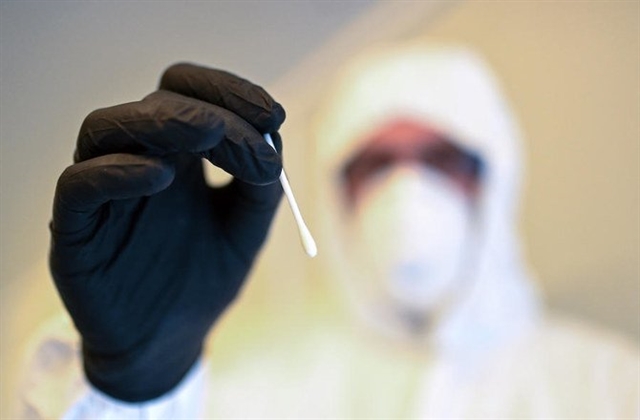 World
World


|
| An employee of an aid organisation shows a sample at a newly established Corona testing station in Dortmund, western Germany, on August 1, 2020, amid the new coronavirus COVID-19 pandemic. — AFP/VNA Photo |
GENEVA — The World Health Organization on Saturday warned the coronavirus pandemic was likely to be "lengthy" after its emergency committee met to evaluate the crisis six months after sounding the international alarm.
The committee "highlighted the anticipated lengthy duration of this COVID-19 pandemic", the WHO said in a statement, and warned of the risk of "response fatigue" given the socio-economic pressures on countries.
The panel gathered Friday for the fourth time over the coronavirus crisis, half a year on from its January 30 declaration of a public health emergency of international concern (PHEIC) -- the WHO's highest level of alarm.
"WHO continues to assess the global risk level of COVID-19 to be very high," it said following the meeting.
The novel coronavirus has killed at least 680,000 people and infected at least 17.6 million since the outbreak emerged in China last December, according to a tally from official sources compiled by AFP.
Unsurprisingly, the panel, comprising 17 members and 12 advisers, unanimously agreed that the pandemic still constituted a PHEIC.
Crisis fatigue warning
Several countries around the world have imposed strict lockdowns in a bid to control the spread of the respiratory disease, plunging economies into sharp contraction.
The committee urged the WHO to provide nuanced, pragmatic guidance on COVID-19 management "to reduce the risk of response fatigue in the context of socio-economic pressures".
The panel urged the WHO to support countries in preparing for the rollout of proven therapeutics and vaccines.
The committee also urged the agency to accelerate research into the remaining "critical unknowns" of the virus, such as the animal source of the disease and potential animal reservoirs.
It called for improved understanding of the epidemiology and severity of COVID-19, including its long-term health effects.
And the committee wanted more light shed on the dynamics of the virus, such as "modes of transmission, shedding, potential mutations; immunity and correlates of protection".
The near six-hour gathering was hosted at the WHO's headquarters in Geneva, with some participants joining via video-link.
The committee will reconvene within the next three months.
Effects 'felt for decades'
Going into the meeting, WHO chief Tedros Adhanom Ghebreyesus said the pandemic's effects would be long-lasting.
"It's sobering to think that six months ago, when you recommended I declare a PHEIC, there were less than 100 cases and no deaths outside China," he said on Friday.
"The pandemic is a once-in-a-century health crisis, the effects of which will be felt for decades to come."
The committee warned countries to prepare their health systems to cope with seasonal influenza and other disease outbreaks alongside the new coronavirus.
They were also urged to "encourage global solidarity" on COVID-19 and address "mis/disinformation" about the virus.
The WHO has been sharply criticised for the length of time it took to declare an international emergency.
The agency has also been criticised for recommendations deemed to be late or contradictory, in particular on wearing masks, or the modes of transmission of the virus. — AFP




